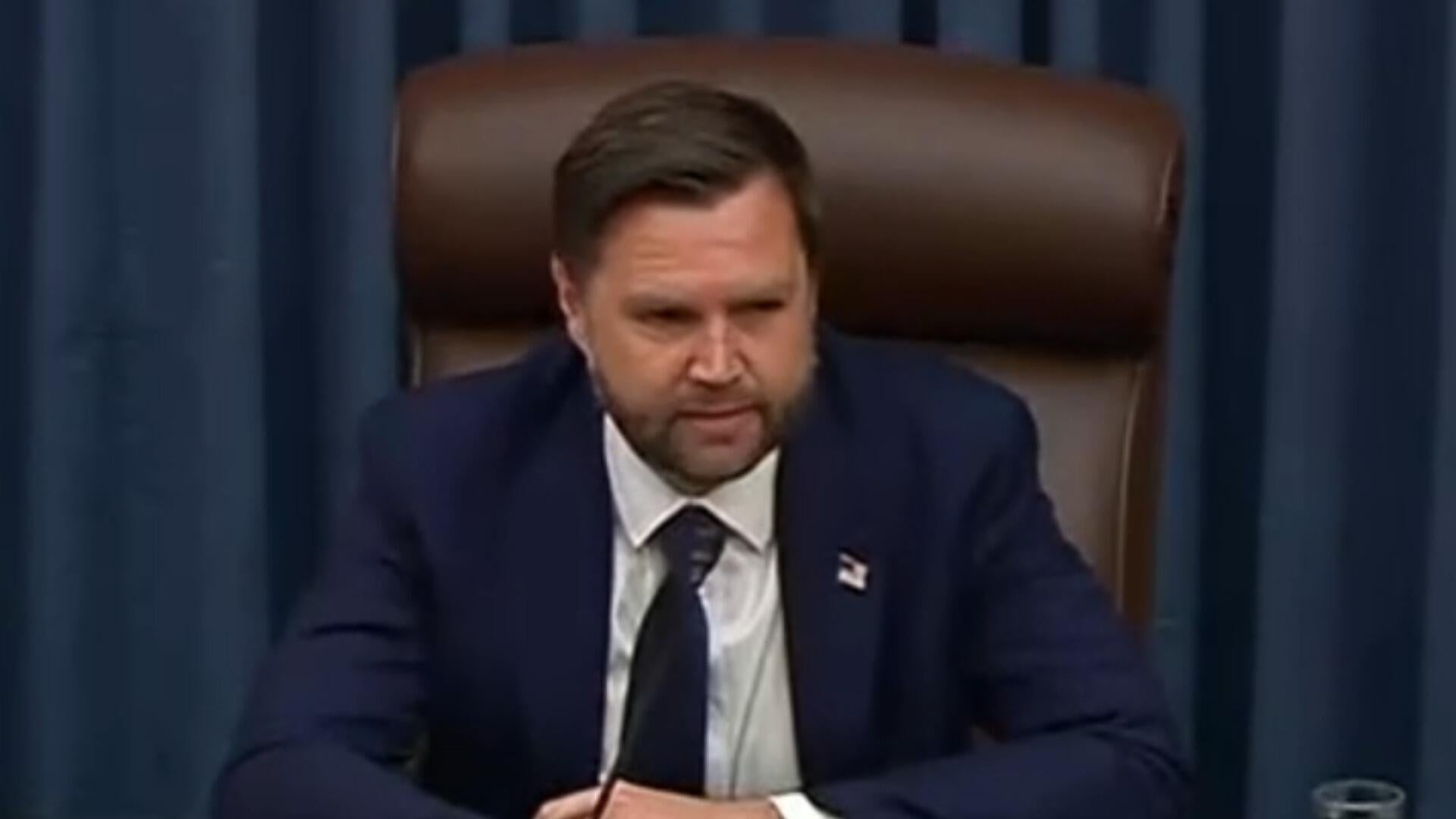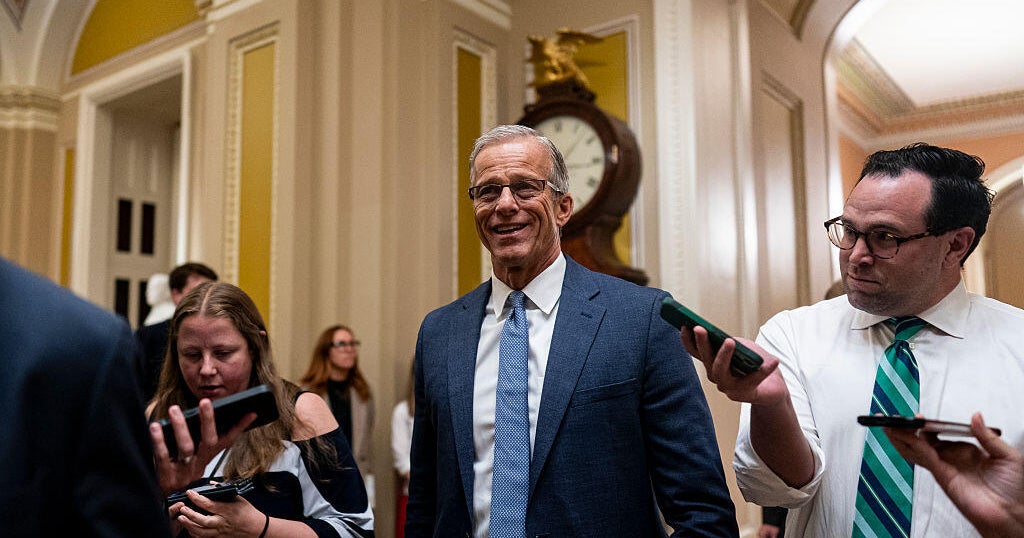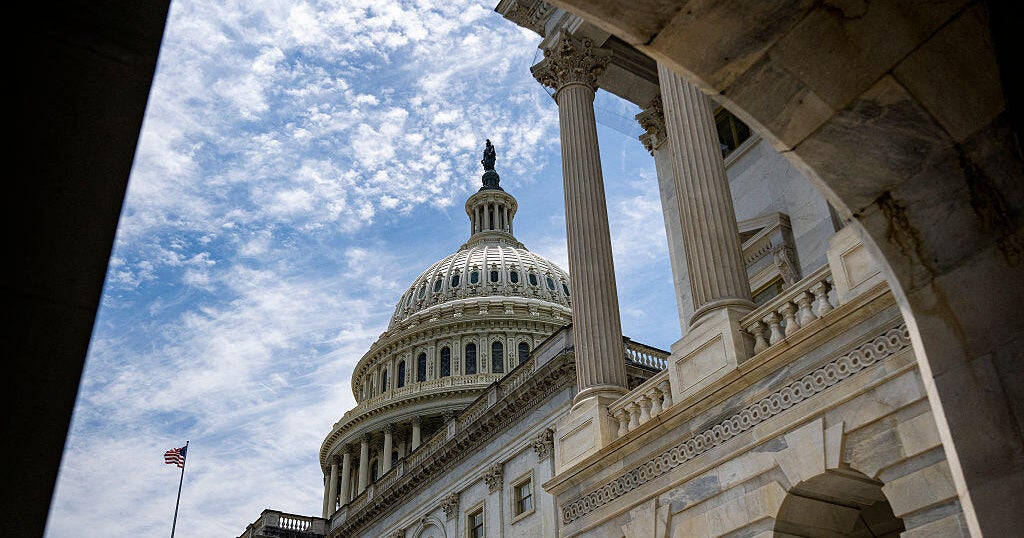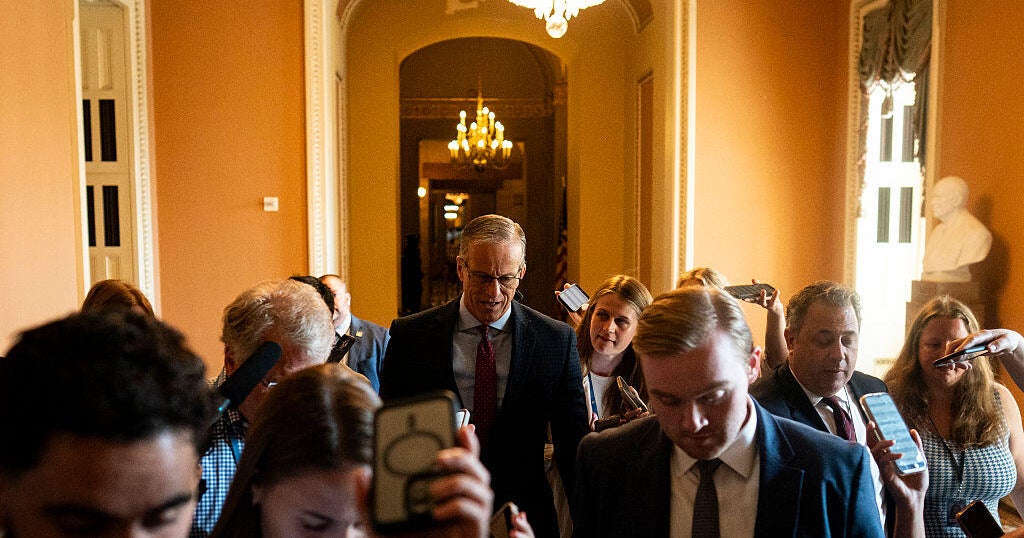Here's what's in Trump's "big, beautiful bill" that passed the 365bet¹Ù·½ÍøÕ¾
Washington — The 365bet¹Ù·½ÍøÕ¾ on Tuesday narrowly passed a massive spending and tax bill that includes signature policies of President Trump's second-term agenda in a 51-50 vote that required Vice President JD Vance to break a tie.
The vote came after a marathon session that featured votes on amendments to key portions of the bill by senators of both parties.
At the center is an extension of Mr. Trump's 2017 Tax Cuts and Jobs Act, which is slated to sunset at year's end. The legislation would make most of the tax cuts permanent, while increasing spending for border security, defense and energy production.
The bill is partially paid for by cuts to health care and nutrition programs, like Medicaid and the Supplemental Nutrition Assistance Program, or SNAP. The Congressional Budget Office estimates the 365bet¹Ù·½ÍøÕ¾'s bill would add $3.3 trillion to federal deficits over the next 10 years and leave millions without health insurance. Republicans and the White House dispute those forecasts.
365bet¹Ù·½ÍøÕ¾ Republicans used a process known as budget reconciliation to pass the bill, which limits the types of policies that can be included in a simple majority vote. A handful of provisions that initially appeared in the bill were ultimately removed, including one that would have ordered the sale of public lands and another that would have paused state regulations on artificial intelligence.
The House passed its own version of the legislation last month, with some key differences. The lower chamber must now approve the 365bet¹Ù·½ÍøÕ¾'s version before it can go to the president's desk. If the House makes changes of its own, the 365bet¹Ù·½ÍøÕ¾ would need to sign off on those as well.
Here's what is in the :
Medicaid restrictions
The legislation includes restrictions on Medicaid, which provides government-sponsored health care for low-income and disabled Americans. Like the House-passed bill, the legislation imposes work requirements for some able-bodied adults and more frequent eligibility checks. But the 365bet¹Ù·½ÍøÕ¾ parliamentarian determined that a measure cutting federal funds to states that use Medicaid infrastructure to provide health care coverage to undocumented immigrants, along with banning Medicaid from covering gender transition services, isn't in compliance with 365bet¹Ù·½ÍøÕ¾ reconciliation rules.
The parliamentarian also weighed in on the provider tax, which states use to help fund their portion of Medicaid costs, in a blow to the 365bet¹Ù·½ÍøÕ¾ GOP's initial plan.
365bet¹Ù·½ÍøÕ¾ Republicans proposed steeper cuts to Medicaid funding, in part by incrementally lowering provider taxes from 6% to 3.5% by 2032. The timeline is delayed by one year from the 365bet¹Ù·½ÍøÕ¾ GOP's initial proposal, after the issue became one of the bill's sticking points in recent weeks. It's a departure from the House-passed bill, which sought to lower federal costs by freezing states' provider taxes at current rates and prohibiting them from establishing new provider taxes.
The bill also includes a rural hospital stabilization fund after some GOP senators expressed concern over how rural hospitals could be impacted by the Medicaid restrictions, allocating $50 billion for rural hospitals over the same period that the provider taxes would be lowered.
Homeland security and immigration
The legislation includes more than $46.5 billion for border wall construction and related expenses, $45 billion to expand detention capacity for immigrants in custody and about $30 billion in funding for hiring, training and other resources for U.S. Immigration and Customs Enforcement.
It also includes a minimum $100 fee for those seeking asylum, down from the $1,000 fee outlined in the House bill. The 365bet¹Ù·½ÍøÕ¾ parliamentarian ruled out the $1,000 fee for anyone applying for asylum.
Increasing the state and local tax deduction, or SALT
The package also includes an increase to the cap on the state and local tax deduction, raising it from $10,000 to $40,000. After five years, it would return to $10,000, a departure from the House-passed bill.
The issue was a major sticking point in the House, where blue-state Republicans threatened to withhold their support without the increase to the deduction. But with no Republicans hailing from blue states in the 365bet¹Ù·½ÍøÕ¾, the upper chamber has been contending with its own dynamics.
Before the rule, taxpayers could deduct all their state and local taxes from their federal taxes, which some policymakers have said mainly benefits wealthy homeowners in states with high taxes, such as New York and California. But advocates for increasing the caps argue that the $10,000 cap is increasingly impacting middle-class homeowners who live in regions where property taxes are rising.
Restrictions on food stamps
The 365bet¹Ù·½ÍøÕ¾ bill still shifts the costs of SNAP, or food stamps, to some states. The program is currently fully funded by the federal government.
The federal government would continue to fully fund the benefits for states that have an error payment rate below 6%, beginning in 2028. States with above 6% would be on the hook for 5% to 15% of the costs. States are also given some flexibility in calculating their share.
The package also aligns with the House version on age requirements for able-bodied adults to qualify for SNAP benefits. Currently, in order to qualify, able-bodied adults between 18 and 54 must meet work requirements. Both the 365bet¹Ù·½ÍøÕ¾ and House bills would update the age requirement to 18 and 64, with some exemptions for parents.
Alaska and Hawaii could receive waivers for the work requirements if it's determined that they're making a "good faith effort" to comply.
Addressing the debt limit
The legislation would raise the debt ceiling by $5 trillion, going beyond the $4 trillion outlined in the House-passed bill. Congress faces a deadline to address the debt limit later this summer.
Treasury Secretary Scott Bessent has urged Congress to address the debt limit by mid-July, saying that the U.S. could be unable to pay its bills as early as August, when Congress is on recess.
By addressing the debt ceiling as part of the larger package, Republicans in Congress are aiming to bypass negotiating with Democrats on the issue. Unlike most other legislation in the 365bet¹Ù·½ÍøÕ¾, the budget reconciliation process that governs the package requires a simple majority, rather than the 60-vote threshold to move forward with a bill.
Child tax credit
The current $2,000 child tax credit is set to return to the pre-2017 level of $1,000 in 2026. The tax credit would permanently increase to $2,200 under the 365bet¹Ù·½ÍøÕ¾ bill, $300 less than the House-passed hike. The House version reverts the increase to $2,000 after 2028.
Limits on overtime and tips deductions
The bill would allow individuals to deduct a certain amount of tip wages and overtime from their taxes. The provisions would expire in 2028.
The "no tax on tips" provision in the spending bill would create a new deduction for tipped workers, eliminating what they owe in federal income tax. Tipped workers would still have to pay state and local income tax and payroll taxes.
The House and 365bet¹Ù·½ÍøÕ¾ vary on a few key points, including how much a worker could claim in deductions. The 365bet¹Ù·½ÍøÕ¾ proposal limits that deduction to $25,000, while the House version is uncapped.
Under the House measure, meanwhile, only people with annual income of $160,000 or less would qualify for the tipping tax break, while the 365bet¹Ù·½ÍøÕ¾ version would phase out benefits for individuals whose income exceeds $150,000 or couples whose income exceeds $300,000.
Changes to standard deduction
The 365bet¹Ù·½ÍøÕ¾ wants to permanently expand the basic standard deduction, which was nearly doubled in 2017. The increases will expire at the end of the year. The House bill, however, would expand the deduction only through 2028.




